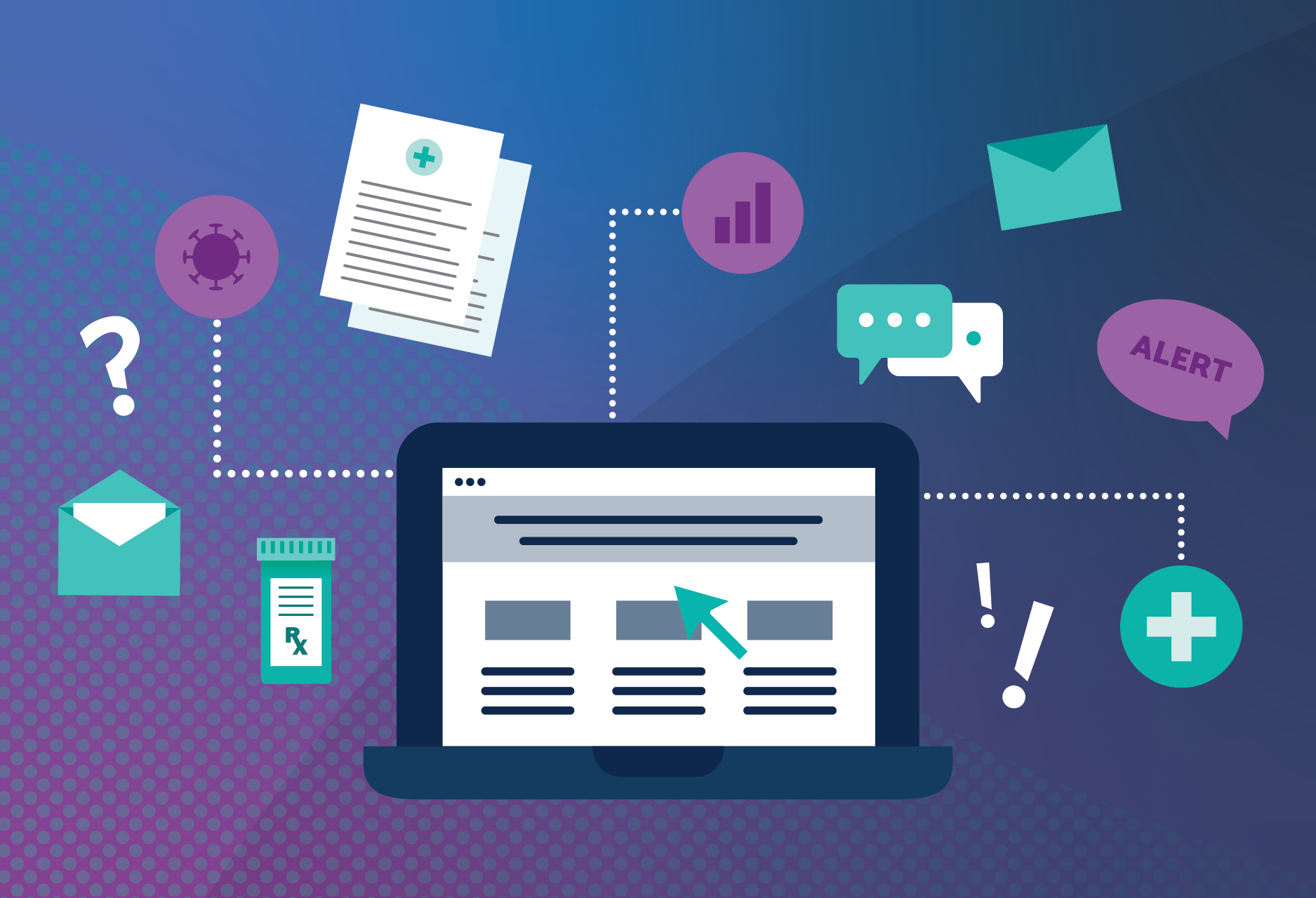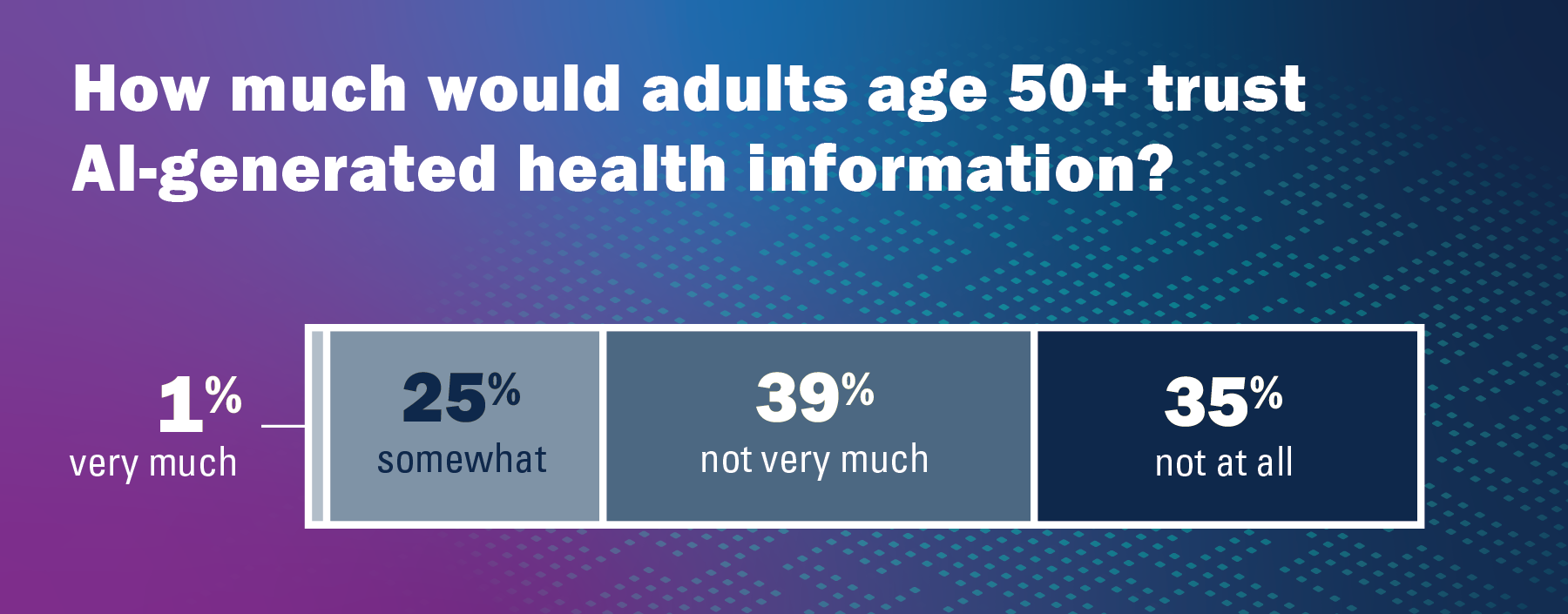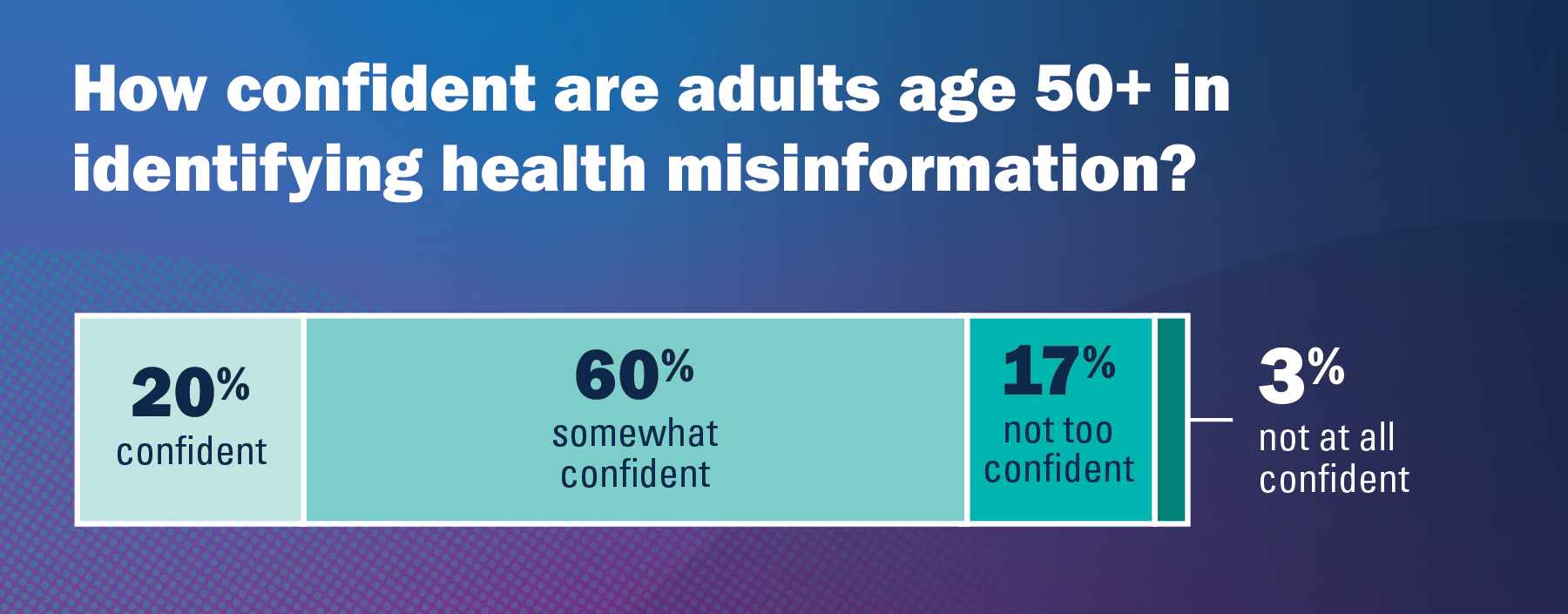
Key Findings
20% of older adults are not confident they can identify health / medical misinformation.
74% of adults age 50 and over would have very little or no trust in health information generated by artificial intelligence (AI).
Health literacy is how well a person can find, understand, and use health information to make decisions and take actions for themselves and others. Health literacy helps build trust in medical settings and public health organizations, and it promotes good health and well-being for all. Strong health literacy skills also help people identify health misinformation — information that is false, inaccurate, or misleading based on the best available evidence or scientific knowledge at the time.
To understand older adults’ health literacy skills and experiences with health misinformation, in February and March 2024 the University of Michigan National Poll on Healthy Aging asked a national sample of adults age 50 and older where they get health information, how trustworthy they find it, and whether they would trust health information generated by artificial intelligence (AI). The poll also asked older adults about their confidence in understanding and finding accurate health information.
Where do older adults get their health information?
In the past year, the majority of adults age 50 and older said they got health information from a health care provider (81%). Older adults also sought or received health information from pharmacists (42%), family / friends with a medical background (18%), or a family / friend without a medical background (14%).
In the past year, over half of older adults (58%) sought health information from a website. The most common types of websites older adults visited for health information were health / health condition-focused sites (like WebMD or healthline.com), used by 39% of older adults, followed by websites run by health care systems (31%). Fewer sought health information from websites run by federal government agencies (21%), nonprofit organizations (like the American Heart Association or American Cancer Society) (14%), or universities / medical schools (11%).
Other sources of health information used by older adults included: insurance companies (20%), hospitals (15%), social media (6%), or community organizations like senior centers or places of worship (3%).
How trustworthy are health information sources?
We asked older adults how trustworthy they find different sources of health information (very, somewhat, not very, or not at all). Among the 87% of adults age 50 and older who sought or received health information from health care providers, pharmacists, or family / friends, many viewed information from these types of people as very trustworthy:
- Health care providers (76%)
- Pharmacists (71%)
- Family / friends with a medical background (62%)
Fewer rated family / friends without a medical background as very trustworthy (16%).
Among the 58% of older adults who used websites for health information, over half thought sites run by universities / medical schools (63%), non-profits (60%), health care systems (59%), or the federal government (57%) were very trustworthy. Fewer (36%) felt this way about health / health condition-focused sites.
Among the 34% of adults age 50 and older who got health information from other sources, 61% thought information from their hospital was very trustworthy. Fewer older adults said health information from insurance companies (38%), community organizations (19%), and social media (11%) was very trustworthy.
Trust in AI-generated health information
Overall, 74% of adults age 50 and over said they would have very little or no trust in health information generated by artificial intelligence (AI) (39% not very much trust, 35% no trust at all). Meanwhile, 25% would find health information from AI somewhat trustworthy, and 1% would find it very trustworthy. Women, individuals with less education (some college or less), people with lower household incomes (less than $60,000), and those without a health care visit in the past year were less likely to say they would trust health information generated by AI.

Finding & identifying accurate health information
In all, 20% of people age 50 and older said they had little or no confidence with being able to identify health / medical misinformation when they see it (17% not too confident, 3% not at all confident). Another 60% of older adults felt somewhat confident identifying health / medical misinformation, and 20% felt confident. Those more likely to have little or no confidence were older adults with fair or poor memory (35%), physical health (28%), or mental health (28%), or a disability that limits activity a lot (25%). Older adults with lower household incomes or less education were also less likely to feel confident.

When it comes to finding accurate health information online, 32% said this task was very easy, 58% found it somewhat easy, and 11% thought it was not easy. Older adults with fair or poor physical health, mental health, or memory were much more likely than those with good / very good / excellent physical health, mental health, or memory to report that it is not easy to find accurate health information online.
Notably, 18% of adults age 50 and older said they did not use the internet at all to look up health information. This percentage was highest among those over age 65 (24%), those who are Black and non-Hispanic (25%), and those with a high school education or less (26%).
Understanding health information in medical settings
Overall, 14% of older adults indicated it is not easy to understand written information from health care providers, and 8% said the same about verbal information.
In all, 26% of older adults were not confident (18% not too confident, 8% not at all confident) they knew or could find information about their out-of-pocket costs before having a medical procedure. Similar portions of older adults were not confident they knew or could find information about their out-of-pocket costs when filling a new prescription (20%; 15% not too confident, 5% not at all confident) or before an office visit with a health care provider (18%; 12% not too confident, 6% not at all confident).
For prescription medications, 90% completely or somewhat agreed that the label attached to their prescription bottle is easy to understand. Older adults had a similar level of agreement (91%) with understanding information that comes with their prescription medications.
When it comes to filling out medical forms, 82% of adults age 50 and older felt extremely / quite a bit confident they could fill out medical forms by themselves; 14% were somewhat confident, and 5% were a little bit / not at all confident.
Implications
Higher health literacy can help people identify and use information to understand medical conditions and make decisions aligned with their health goals. Our poll results suggest that while many adults age 50 and older do not face health literacy challenges, there are still many others who find identifying and using health information difficult. For example, although most older adults think finding accurate health information online is relatively easy, those with fair / poor physical health, mental health, or memory were more likely to report difficulty finding such information. Similarly, a large proportion of adults age 50 and older feel confident identifying health misinformation when they see it. However, those with fair / poor physical health, mental health, or memory, or an activity-limiting disability, were less likely to be confident spotting health misinformation.
Lower levels of health literacy can have negative consequences for older adults. For example, individuals with lower health literacy may underuse evidence-based preventive care or may not be able to follow through on their health care provider’s recommendations. Lower health literacy can also lead to difficulties managing chronic conditions and recognizing warning signs of complications.
One possible way to improve access to and use of health information across levels of health literacy is through AI-based tools. Such AI applications are becoming increasingly common in health websites and apps. Yet, these poll results show widespread distrust of AI-generated health information among older adults. Helping older adults better understand AI-generated health information and how it can be used to support them in achieving their health goals may help address these concerns.
Older adults and their families can support loved ones who have difficulty finding trusted sources of health information and spotting misinformation. Such individuals may also benefit from extra support from both their health care team and the people they trust, who can help navigate the increasingly complex amount of health information that is available.
While it may seem daunting to ask questions during health care visits, asking providers to clarify medical terms, instructions, or procedures can greatly help patients better understand their care and feel more involved in the decision-making process. Patients may also find it helpful to write down their questions before each visit with their provider. After-visit summaries and patient portals can also aid in understanding health information and improve health outcomes.
Health care organizations and providers play a vital role in supporting older adults who have difficulty understanding health information. Streamlining written communications, using plain language, and / or supplementing written information with visual aids such as pictures, videos, tables, charts, and graphics may help people with lower health literacy better understand health information, make decisions, and take actions. Providing a verbal overview of health information via a recording and / or offering follow-up calls may also aid patients.
Community and social service organizations can help older adults and caregivers identify trusted sources of health information, understand written communications from clinicians, and spot misinformation.
Data Source and Methods
This National Poll on Healthy Aging report presents findings from a national household survey conducted exclusively by NORC at the University of Chicago for the University of Michigan’s Institute for Healthcare Policy and Innovation. This survey module was administered online and by phone from February 22nd–March 12th, 2024 to a randomly selected, stratified group of U.S. adults age 50–101 (n=3,379), with an oversample of non-Hispanic Black and Hispanic populations. The survey completion rate was 44% among panel members invited to participate. The margin of error is +/– 1 to 4 percentage points for questions asked of the full sample and higher among subgroups.
Findings from the National Poll on Healthy Aging do not represent the opinions of the University of Michigan. The University of Michigan reserves all rights over this material.
Read other National Poll on Healthy Aging reports and about our Michigan findings, and learn about the poll methodology.
Citation
Keenan T, Lampkin C, Strunk S, Singer D, Solway E, Roberts S, Box N, Smith E, & Kullgren J. Health Literacy: How Well Can Older Adults Find, Understand, and Use Health Information? University of Michigan National Poll on Healthy Aging. October 2024. Available at https://dx.doi.org/10.7302/24456
This is an updated version of the report as of October 22, 2024 that reflects a minor correction to the results first presented on October 16, 2024.